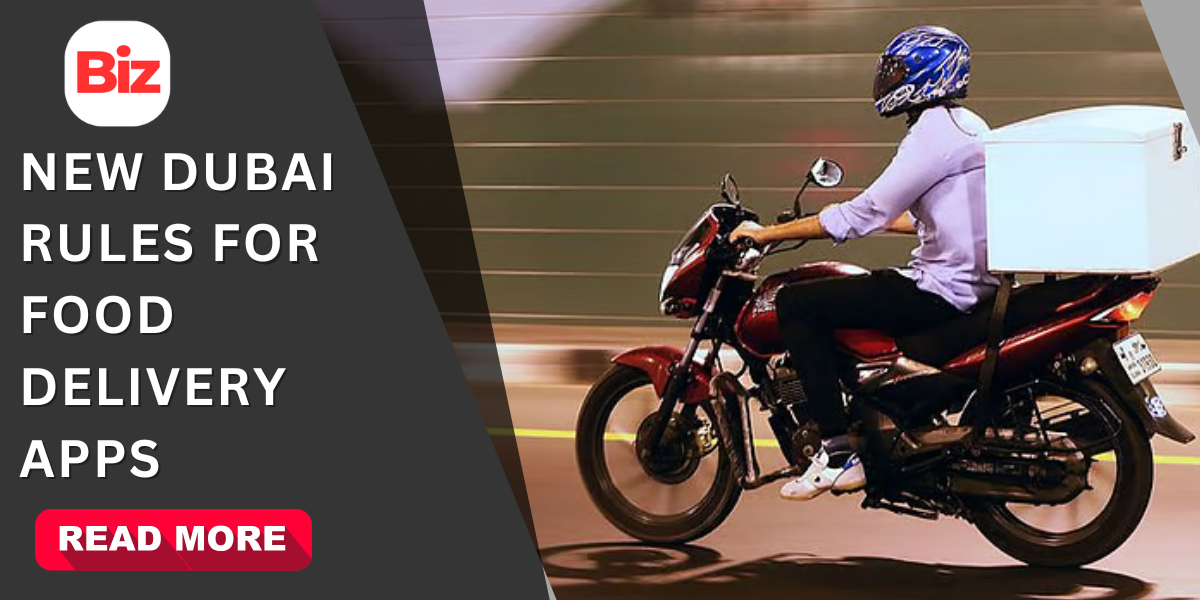- The Fast Growth of Food Delivery in Dubai.
- No Secrecy to Customers: No More Secret Fees.
- More Equitable Restaurant System.
- Enhancing the User Experience.
- Protecting Consumer Rights
- Promoting Competition and Novelty.
- Global Comparisons
- What This Implicates on the Residents.
- The Future of Food Delivery in Dubai.
- Final Thoughts
Millions of people in the emirate have made it their way of life to order food online. Home-cooked meals to late-night orders, food delivery applications have become an inseparable part of the Dubai lifestyle. But with the expansion of the industry, there have been increasing complaints of concealed fees, huge commissions, and baffling fee constructions.
To counter this, Dubai has implemented new regulations on food delivery apps, which will help to increase transparency and user experience and introduce a more balanced approach between restaurants, customers, and platforms. These reforms are included in the current digital transformation strategy of the city, so that its services remain in line with the needs of its citizens without losing international standards.
The Fast Growth of Food Delivery in Dubai.
Dubai has had a tremendous rise in food delivery over the last 10 years. Mobile applications such as Talabat, Deliveroo, Noon Food, Careem, and Zomato are now a household name and they provide direct access to thousands of restaurants with just a touch of a button.
Usage increased during the COVID-19 pandemic when everyone was restricted to eating out. The habit remained after restrictions were removed. The food delivery industry in UAE is currently estimated to be worth billions of dirhams every year, according to market reports, and it keeps increasing.
And as it grew so came new challenges:
- Nonaire of establishable prices aggravated the customers.
- Large commissions put pressure on the profit margins of restaurants.
- Poor policies created distrust among platforms, restaurants and consumers.
The new regulations in Dubai deal with these areas head-on and will be quite a change in the way the industry will run in the future.
No Secrecy to Customers: No More Secret Fees.
Among the greatest customer frustrations has been the abrupt increase in prices between window shopping and check out. Many users surprised by:
- Service charges
- Packaging fees
- Platform commissions
The new regulations make delivery apps show all the costs upfront before confirming an order. It implies that when a customer orders something, he/she will be aware of how much he/she is paying and why.
To illustrate, when a burger meal is priced at AED 40, the app has to disaggregate whether the price increases to AED 55 as a result of AED 8 delivery costs, AED 5 packaging costs and a AED 2 service cost. This form of transparency does away with the lack of understanding and creates a sense of trust between platforms and customers.
More Equitable Restaurant System.
When customers had to grapple with surreptitious charges, restaurants had to grapple with exorbitant commission rates imposed by delivery applications. In other instances, the commissions were up to 2530 percent of the order value, leaving restaurants, particularly small and medium-sized restaurants, with extremely slim margins.
The new Dubai regulations are supposed to re-equilibrium this relationship. Key changes include:
- Commission rate caps so that restaurants do not overprice.
- Transparency in the extent to which the payment made by the customer is passed on to the restaurant.
- More reasonable terms of contracts that would allow not to patronize small companies.
This will likely assist independent and family-owned restaurants, the staples of the varied food culture in Dubai, to stay competitive within the increasingly popular delivery ecosystem.
Enhancing the User Experience.
The government of Dubai has also worked on improving the user experience of food delivery applications in general. The reforms demand platforms to modernize some features:
- Fastened checkout that has fewer processes and separate fee structures.
- Order tracking in real time with a precise estimate of preparation and delivery time.
- Improved customer service by responding to complaints more efficiently, providing faster refunds and more explicit policies on compensation.
- Standardized regulations regarding reimbursement of late or faulty orders.
To customers, it implies that they have greater confidence in ordering and that they will not experience frustration when things go bad. In the case of restaurants, it minimizes chances of conflicts and facilitates the smooth running of operations.
Protecting Consumer Rights
The other important area of the reforms is the protection of consumers. Previously there was a group of users who felt that they had minimal options available to them when dealing with late deliveries, missing deliveries or unjustified charges. The new regulations create more transparent complaint options, allowing customers the right to present complaints straight to apps and, in case they are not resolved, forward them to the consumer protection authorities.
This strategy reflects the broader vision of Dubai to empower the consumer and to deliver high standards of digital services.
Promoting Competition and Novelty.
The new rules will also promote healthy competition among food delivery platforms by creating more equal conditions both for restaurants and consumers. The positioning of apps will no longer be based on a concealed fee or predatory model of commission, but on innovation, quality of service, and customer contentment.
This could lead to:
- Improved value added loyalty programs.
- Green packaging to match the sustainability requirements of the city of Dubai.
- More intelligent delivery applications, e.g. drone or robot deliveries in the future.
The result? More dynamic and innovating food delivery ecosystem in Dubai.
Global Comparisons
The decision by Dubai to regulate food delivery services reflects a tendency in the rest of the world.
In New York and San Francisco, other cities in the United States, a commission cap was placed on delivery platforms in order to protect restaurants.
Regulators in Europe have wanted increased price transparency and employee rights.
Other Asian nations such as Singapore and India have also come up with rules to strike a balance between restaurants, apps and customers.
The approach adopted by Dubai is indicative of its own ecosystem, yet in line with the best practices of the international arena, further enhancing the status of the emirate as a pioneer in fair and progressive regulation.
What This Implicates on the Residents.
To the people of Dubai, the new regulations mean a more convenient, more equitable, and trustworthy experience in food delivery:
- No more hidden fees.
- Increased confidence of the pricing system.
- Better resolution of problems as they occur.
In the case of restaurants, especially small and independent restaurants, the reforms will enable them to play a much more equal game, keeping the variety of food offerings that Dubai is known to have.
The Future of Food Delivery in Dubai.
These food delivery reforms are not the only ones as Dubai proceeds to make the transition into a smart city. The authorities may consider additional actions in the future which includes:
- This should be sustainable packaging to minimize wastage.
- Promoting AI-based logistics in order to reduce delivery time.
- Subsidizing and / or providing special programs to local food entrepreneurs.
Finally, the objective of the city becomes clear: to be sure that technology can serve people in the most transparent, fair, and efficient manner possible.
Final Thoughts
The new Dubai regulations in food delivery application can be seen as a significant milestone in the development of the digital economy in the emirate. These reforms provide a win-win scenario, benefiting all involved stakeholders because with transparency, fair treatment and user experience, customers have a better understanding of pricing, restaurants are treated fairly and platforms are driven to innovate in a responsible manner.
The possibility of ordering food online in Dubai has never been more convenient–and with these reforms, it has never been more transparent, just, or consistent.








